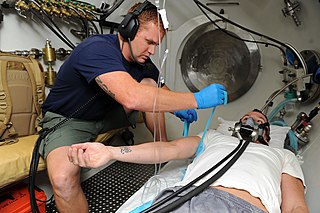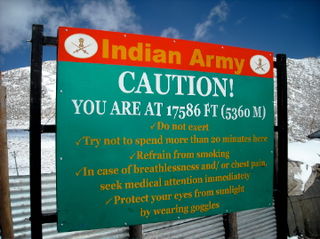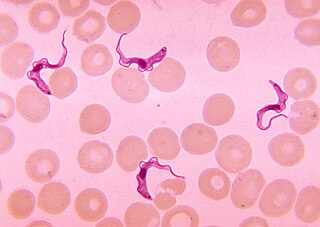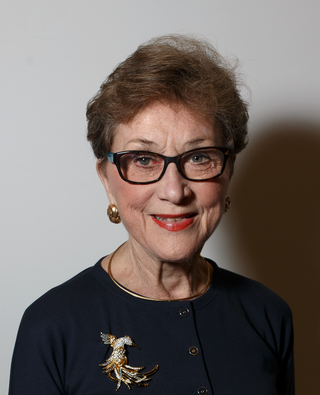
A disease is a particular abnormal condition that adversely affects the structure or function of all or part of an organism and is not immediately due to any external injury. Diseases are often known to be medical conditions that are associated with specific signs and symptoms. A disease may be caused by external factors such as pathogens or by internal dysfunctions. For example, internal dysfunctions of the immune system can produce a variety of different diseases, including various forms of immunodeficiency, hypersensitivity, allergies, and autoimmune disorders.

Decompression sickness is a medical condition caused by dissolved gases emerging from solution as bubbles inside the body tissues during decompression. DCS most commonly occurs during or soon after a decompression ascent from underwater diving, but can also result from other causes of depressurisation, such as emerging from a caisson, decompression from saturation, flying in an unpressurised aircraft at high altitude, and extravehicular activity from spacecraft. DCS and arterial gas embolism are collectively referred to as decompression illness.

Motion sickness occurs due to a difference between actual and expected motion. Symptoms commonly include nausea, vomiting, cold sweat, headache, dizziness, tiredness, loss of appetite, and increased salivation. Complications may rarely include dehydration, electrolyte problems, or a lower esophageal tear.

Altitude sickness, the mildest form being acute mountain sickness (AMS), is a harmful effect of high altitude, caused by rapid exposure to low amounts of oxygen at high elevation. People's bodies can respond to high altitude in different ways. Symptoms of altitude sickness may include headaches, vomiting, tiredness, confusion, trouble sleeping, and dizziness. Acute mountain sickness can progress to high-altitude pulmonary edema (HAPE) with associated shortness of breath or high-altitude cerebral edema (HACE) with associated confusion. Chronic mountain sickness may occur after long-term exposure to high altitude.

African trypanosomiasis is an insect-borne parasitic infection of humans and other animals.
In Sickness and in Health is a BBC television sitcom that ran between 1 September 1985 and 3 April 1992. It is a sequel to the successful Till Death Us Do Part, which ran between 1966 and 1975, and Till Death..., which ran for one series of six episodes in 1981. The series includes 47 episodes, and, unlike its predecessor, all the episodes have survived and are available on DVD.

Acetazolamide, sold under the trade name Diamox among others, is a medication used to treat glaucoma, epilepsy, acute mountain sickness, periodic paralysis, idiopathic intracranial hypertension, heart failure and to alkalinize urine. It may be used long term for the treatment of open angle glaucoma and short term for acute angle closure glaucoma until surgery can be carried out. It is taken by mouth or injection into a vein. Acetazolamide is a first generation carbonic anhydrase inhibitor and it decreases the ocular fluid and osmolality in the eye to decrease intraocular pressure.
Decompression Illness (DCI) comprises two different conditions caused by rapid decompression of the body. These conditions present similar symptoms and require the same initial first aid. Scuba divers are trained to ascend slowly from depth to avoid DCI. Although the incidence is relatively rare, the consequences can be serious and potentially fatal, especially if untreated.

Marriage vows are promises each partner in a couple makes to the other during a wedding ceremony based upon Western Christian norms. They are not universal to marriage and not necessary in most legal jurisdictions. They are not even universal within Christian marriage, as Eastern Christians do not have marriage vows in their traditional wedding ceremonies.

Vertigo is a condition in which a person has the sensation that they are moving, or that objects around them are moving, when they are not. Often it feels like a spinning or swaying movement. It may be associated with nausea, vomiting, perspiration, or difficulties walking. It is typically worse when the head is moved. Vertigo is the most common type of dizziness.
Presenteeism or working while sick is the act or culture of employees continuing to work as a performative measure, despite having reduced productivity levels or negative consequences. Reduced productivity during presenteeism is often due to illness, injury, exhaustion, or other conditions, but presenteeism can also describe working while contagiously sick, which has the added risk of creating a workplace epidemic.
National health insurance (NHI), sometimes called statutory health insurance (SHI), is a system of health insurance that insures a national population against the costs of health care. It may be administered by the public sector, the private sector, or a combination of both. Funding mechanisms vary with the particular program and country. National or statutory health insurance does not equate to government-run or government-financed health care, but is usually established by national legislation. In some countries, such as Australia's Medicare system, the UK's National Health Service and South Korea's National Health Insurance Service, contributions to the system are made via general taxation and therefore are not optional even though use of the health system it finances is. In practice, most people paying for NHI will join it. Where an NHI involves a choice of multiple insurance funds, the rates of contributions may vary and the person has to choose which insurance fund to belong to.
Sick leave is paid time off from work that workers can use to stay home to address their health needs without losing pay. It differs from paid vacation time or time off work to deal with personal matters, because sick leave is intended for health-related purposes. Sick leave can include a mental health day and taking time away from work to go to a scheduled doctor's appointment. Some policies also allow paid sick time to be used to care for sick family members, or to address health and safety needs related to domestic violence or sexual assault. Menstrual leave is another type of time off work for a health-related reason, but it is not always paid.

Dame Carol Mary Black is a British physician, academic, specialising in rheumatology. She was President of the Royal College of Physicians from 2002 to 2006, advised the British Government on the relationship between work and health from 2006 to 2016, and was Principal of Newnham College, Cambridge, from 2012 to 2019. She is an expert on the disease scleroderma.

In the Catholic Church, the anointing of the sick, also known as Extreme Unction, is a Catholic sacrament that is administered to a Catholic "who, having reached the age of reason, begins to be in danger due to sickness or old age", except in the case of those who "persevere obstinately in manifest grave sin". Proximate danger of death, the occasion for the administration of Viaticum, is not required, but only the onset of a medical condition of serious illness or injury or simply old age: "It is not a sacrament for those only who are at the point of death. Hence, as soon as anyone of the faithful begins to be in danger of death from sickness or old age, the fitting time for him to receive this sacrament has certainly already arrived."

Green Tobacco Sickness (GTS) is a type of nicotine poisoning caused by the transdermal absorption of nicotine from the surface of tobacco plants. Tobacco plants that have yet to be cured are referred to as "green tobacco". Nicotine is a water soluble chemical, therefore the risk of GTS is elevated if this chemical from the tobacco plants mixes with any sort of moisture.
Serum sickness in humans is a reaction to proteins in antiserum derived from a non-human animal source, occurring 5–10 days after exposure. Symptoms often include a rash, joint pain, fever, and lymphadenopathy. It is a type of hypersensitivity, specifically immune complex hypersensitivity. The term serum sickness–like reaction (SSLR) is occasionally used to refer to similar illnesses that arise from the introduction of certain non-protein substances, such as penicillin.

"In Sickness and in Health" is the fourth episode of the NBC horror anthology Fear Itself. The episode guest-starred Psych co-stars Maggie Lawson and James Roday.











